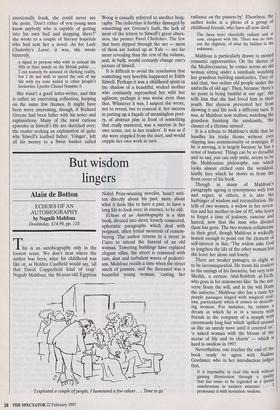But wisdom
lingers
Main de Botton
ECHOES OF AN AUTOBIOGRAPHY by Naguib Mahfouz Doubleday, £14.99, pp. 118 This is an autobiography only in the loosest sense. We don't hear where the author ivas born, what his childhood was like or, as Holden Caulfield would say, 'all that David Copperfield kind of crap'. Naguib Mahfouz, the 86-year-old Egyptian Nobel Prize-winning novelist, hasn't writ- ten directly about his past; more about what it feels like to have a past, to have a long life to look over; in essence, to be old.
Echoes of an Autobiography is a slim book, divided into short, loosely connected, aphoristic paragraphs which deal with poignant, often lyrical moments of remem- bering. The author returns to a street in Cairo to attend the funeral of an old woman. Towering buildings have replaced elegant villas, the street is crammed with cars, dust and turbulent waves of pedestri- ans. Mahfouz recalls a time when the street smelt of jasmine, and the deceased was a beautiful young woman, 'casting her `I exploited a couple of people, I humoured a few others . . . Time to go.' radiance on the passers-by'. Elsewhere, the author looks at a photo of a group of childhood friends, who have all now died: The faces were cheerfully radiant and at ease, eloquent with life. There was no hint, not the slightest, of what lay hidden in the unknown.
Mahfouz is particularly drawn to missed romantic opportunities. On the shores of the Mediterranean, he conies across an old woman sitting under a sunshade watching her grandson building sandcastles. They sit and chat, 'two sedate old people under the umbrella of old age'. Then, because 'there's no point in being bashful at our age', she tells him that she had loved him in their youth. But shyness prevented her from showing it and life took a different turn. It was, as Mahfouz now realises, watching the grandson finishing the sandcastle, 'the chance of a lifetime missed'.
It is a tribute to Mahfouz's skills that he handles his tricky theme without ever slipping into sentimentality or nostalgia. If he is moving, it is largely because he has a sense of humour. Things can be so dreadful and so sad, you can only smile, seems to be the Mahfouzian philosophy, one which looks almost etched onto the wrinkled, kindly face which he shows us from the front cover of his book.
Though in many of Mahfouz's paragraphs ageing is synonymous with loss and regret, in others, it is also the harbinger of wisdom and reconciliation. He tells of two women, a widow in her seven- ties and her mother-in-law of 85, who learn to forget a time of jealousy, rancour and hatred, now that the man who divided them has gone. The two women collaborate in their grief, though Mahfouz is wickedly honest enough to point out the element of self-interest in this: 'The widow asks God to lengthen the life of the other woman lest she leave her alone and lonely.'
There are weaker passages, so slight as to be inconsequential. He treats his readers to the sayings of his favourite, but very trite Sheikh, a certain Abd-Rabbith who goes in for statements like: 'In the uni- verse floats the will, and in the will floats the universe.' Mahfouz also has a taste for purple passages tinged with magical real- ism, particularly when it comes to describ- ing women. For instance, he relates a dream in which he is in a tavern with friends in the company of a nymph with enormously long hair which 'spilled around us like an unruly wave until it covered us', `a naked woman with the bloom of the nectar of life and its charm' — which is hard to swallow in 1997.
Nevertheless, one reaches the end of the book ready to agree with Nadine Gordimer, who in her introduction judges that, It is impossible to read this work without gaining illumination through a quality that has come to be regarded as a quaint
anachronism in modern existence • I pronounce it with hesitation: wisdom.


























































 Previous page
Previous page